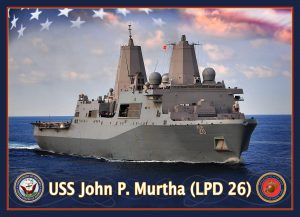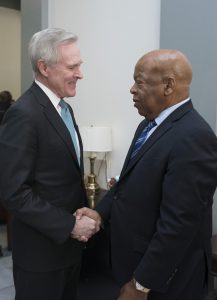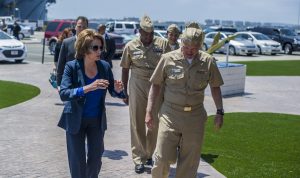 Under President Trump’s new SECNAV, the Navy’s first fight will be domestic.
Under President Trump’s new SECNAV, the Navy’s first fight will be domestic.
Shortly after confirmation, SECNAV Richard V. Spencer will purge the Fleet of some politically and societally-challenging ship names. Count on it.
Purveyors of routine DC conventional wisdom may scoff, but a renaming campaign before the 2018 Midterm Elections is inevitable.
And it won’t be a quiet thing, either. As base-energizing fodder, a renaming campaign will be high-profile. Expect some big White House executive order and a rally or two to celebrate the ongoing roll-back of that nasty ‘ole Barack Obama legacy. It won’t be subtle.
And poor, old out-of-touch and norm-bound Democrats have no idea this is coming. To Nancy Pelosi and her tired, outdated ilk, such a step just isn’t in the realm of the possible!
Sigh.
Such is politics these days. But this is how a culture-war-weary Navy–which wasn’t excited about harboring ships with “socially edgy” names anyway–earns the gratitude of a grateful Republican Congress….and gets the Navy closer to 355 ships.
 USS Liberal Tears
USS Liberal Tears
I’ll be frank. The first target for renaming will be the new oilers. With the T-AO-205 Class named for John Lewis, they’re an easy target. For the Trump/Pence Base, it’ll be an ideal Mid-Term renaming initiative that can be counted on to spark all that demonstrative-but-ineffective liberal outrage President Trump’s base relishes.
There is just no way a ship class whose proposed names range from San Francisco gay rights leader Harvey Milk to Robert Kennedy, Earl Warren and to noted abolitionist and women’s rights leaders Sojourner Truth and Lucy Stone can survive a Trump/Pence Administration.
As these ships are not even under construction, the Naval History and Heritage Command’s 2013 Ship Naming Report reminds us first that ship naming is a presidential prerogative:
Indeed, the naming of Navy ships has always been a subject of Presidential interest to a greater or lesser extent. As will be explained in greater detail later in this report, President George Washington personally selected the names of the US Navy’s first five ships; President Theodore Roosevelt dictated the names for “his” battleships; and President Franklin D. Roosevelt personally modified Navy ship naming conventions. As a result, when a President makes his opinions on ship naming known, all Secretaries listen and comply.
The report also reminds us all that renaming a Navy ship after construction starts is also easy:
On 6 October 2011, in consonance with this newly modified JHSV naming convention, Secretary Mabus renamed JHSV 2 (ex‐Vigilant) USNS Choctaw County (pop. 15,000). Then, on 30 May 2012, in accordance with the signed agreement with the Army, he renamed JHSV 3 (ex‐Fortitude) USNS Millinocket, in honor of the towns of Millinocket and East Millinocket, Maine, with a combined population of about 7,000 people.
Now, the opportunity to easily rename other in-construction ships with names that might discomfit President Trump–DDG-1002 Lyndon B. Johnson, and CVN-79 John F. Kennedy–have probably passed. But if the Trump/Pence White House wants to be extra-provocative, the President can order the names changed. It could be a popular move–the SECNAV has some old-fashioned legacy-endowed names available that fit within existing naming parameters (i.e. reviving some unused “old carrier” names–Langley, Ranger, Lexington, Saratoga, etc.–for the carriers and reverting to the existing “hero” nomenclature for Destroyers) then the President could, in an ironic move, claim the mantel of “defender of maritime traditions” while simultaneously abolishing the relative stability offered by existing naming traditions.
But as for the initial–and now chronic–irritants–commissioned vessels USS Gabby Giffords, USS John P. Murtha or the USNS Medgar Evers and USNS Cesar Chavez–I just don’t see them being renamed. As political irritants, their very existence serves to nurture the social grievances that motivate the Trump base. Renaming them now–after they’re already in service–would be against all the norms of standard political–and Navy–behavior. But then again, for an administration that prides itself on breaking norms–particularly those relatively painless ceremonial ones–such a gambit offers a huge political payoff. It’s the sort of deal Trump would love, and you can bet that Bannon–Navy vet that he is–is mulling it.
I also see the Columbia Class SSBN getting renamed as well–but my sense is that this renaming opportunity will be tucked away for later use in the run-up to the 2020 election if the Trump/Pence Administration moves forward on their dream of ending the dreams of DC Statehood by splitting DC proper between Maryland and Virginia.
 Conclusion
Conclusion
Though some of these names are less-than-popular within the Navy (and despised by a vocal segment of the veteran community) I would urge the Navy to start preparing a mitigation plan now–identifying orthodox names and preparing to limit any potential for radicalization of the service.
Democrats in Congress have some levers here as well. While, for me (an avowed traditionalist), renaming isn’t a hill to die upon, my internal brawler senses that Senate Democrats would be smart to ask pointed questions tomorrow during the SECNAV confirmation hearing. If the Democrats had any desire to seize the national political initiative–and even if they weren’t going to really contest the matter–they’d still have John Lewis and Gabby Giffords stop by the nomination hearing room just to drive the political pain point home with some good newsworthy visuals.
But that won’t happen.
The chance a meteor would strike DC is higher than the likelihood somnolent Congressional Democrats will embrace a full-on political brawl. So…expect the stockpile of socially-edgy ship names to be converted into political energy for the Mid-Terms that, hopefully, shortly after, provides materiel benefit to a growing Navy. And when that happens, I do hope the new SECNAV and other Navy stakeholders take a quiet moment to reflect on how the ever-underestimated Ray Mabus provided the Navy such a big political bargaining chip in the first place.
Think what you will, but Ray Mabus played the orthogonal chess game that is modern-day ship naming with great aplomb and political skill–he was second only to the SECNAV John Lehman in converting a thankless ceremonial procedure into political capital. At the end of the day, Mabus’ ship names–however irritating they are to some–recognized some authentic American heroes while giving the Navy a good political chit to play no matter which party won the White House.
